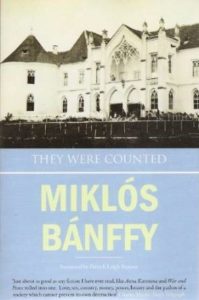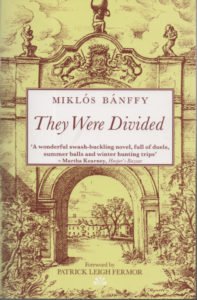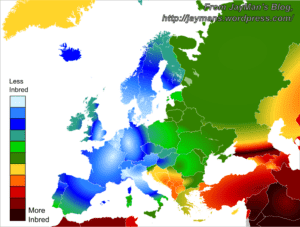


05/01/2016

Spencer in Time. I was sitting in a doctor’s office late in April browsing the magazines. They had recent issues of Time. Flipping through the April 25th issue, who should I see looking out at me from page 41 but Richard Spencer, whose Beemer once graced my driveway for several days. (Richard was staying in Brooklyn and needed a place to leave the car.)
Richard’s picture was illustrating an article by Alex Altman, headline: The Billionaire and the Bigots. The point of the article, Time being a Main Stream Media outlet, was of course to show that Donald Trump is obviously a thought criminal because he has the support of the Dissident Right — the name I prefer for what Altman calls the Alt Right — people like Richard Spencer (and us!)
Our own Alexander Hart posted a good critique of the Time article here at VDARE.com on April 28th. I only want to add one point my colleague left out.
It’s a passage in the Time article that struck me with such force, I scribbled it down while waiting for the doctor. Most of it is a quote from a person Altman encountered in his researches into the Dissident Right fever swamp. Here is the passage as I wrote it down.
“Diversity brings differences, and sometimes those differences are so irreconcilable, they cause conflict,” said Nathan Damigo, a 29-year-old student from Oakdale, Calif., who blogs about incidents of alleged anti-white bias. To Damigo, a former Marine who fought on the sectarian battle fields of Iraq, the rise of a candidate like Trump was inevitable. “This is what happens in all multiracial, multi-religious, multiethnic societies,” he said. “Identity politics trumps everything else.” [Links added]
This caught my attention just because it’s so darn reasonable. I imagine a lot of Time readers — people by no means sympathetic to the Dissident Right — must have scratched their heads reading that, muttering: "Well, yeah." It’s actually hard to argue with it, unless you've spent the last fifty years in a sensory-deprivation tank.
This Time writer, who’s supposed to be trying to show his readers how crazy we Dissident Rightists are, is calling down fire on his own position by including that passage. Why did he include it?
There are two possibilities.
(1) Altman is so far away in multiculti cloud-cuckoo land, Nathan Damigo’s mild and obvious remarks do sound crazy to him.
(2) Altman is a Dissident Right mole, perhaps on Richard Spencer’s payroll, deliberately sabotaging his own article.
I naturally like (2) much the better. As a cold-eyed realist, though, I have to agree that (1) is far more probable.

Is God Dead? Another issue of Time, or possibly the same one (it was a long wait for that doctor) had a note on this month being the 50th anniversary of Time’s "Is God Dead?" cover.
By coincidence, earlier this month the Derb family’s Netflix choice was The Barbarian Invasions, a French-Canadian movie from 2003, recommended to us by a friend recently back from Canada.
The movie? Well, it’s awfully French: sex, death, the Meaning Of It All. If you don’t mind that sort of thing, though, it’s not bad.
There is one particular scene that stuck in my mind, then bobbed up to the surface when I was reading that Time note about the "Is God Dead?" issue of April, 1966.
At one point in the movie a priest, played by Gilles Pelletier, is reminiscing about his career. There was a moment when people just stopped coming to Mass, he said. It was a sudden thing, almost from one week to the next. In 1966.
Did he — I mean, I guess, the writer/director Denys Arcand — have that Time issue in mind? It didn’t sound like it. The remark was part of some larger issue the priest was talking about, nothing to do with newsmagazines. Odd that he should have picked on that particular year, though.
Great unpublished Letters to the Editor.
From: John Derbyshire
Sunday, April 17th, 2016
Sir:
The "brief history of Chinese underwear" in your April 16th edition (page 36) notes that "underpants for women were rare" in pre-modern China.
The little red look: a brief history of underwear in China https://t.co/8VbiTwwskA pic.twitter.com/C8wM3OFzX7
— The Economist (@TheEconomist) April 14, 2016
Possibly so, but some kind of lingerie was causing trouble around 600 B.C.
Duke Ling of Chen, with Kong Ning and Yi Hangfu, all had an intrigue with Xia Ji and each of the three of them wore an article of her under clothing, with which they made game with one another in the court. Xie Ye remonstrated with the duke, saying, "When ruler and ministers thus proclaim their lewdness, the people have nothing good to imitate. The report of such things is not good; let your lordship put that article away." The duke said he would change his conduct, but he told the other two what Xie Ye had said; and when they asked leave to kill him, he did not forbid them. Ye thereon was killed.
— From Zuo’s Chronicle, Book VII, 9th year (i.e. 600-599 B.C.) Parallel text, Chinese and English, online here.
The Hungarian War and Peace. In my February diary, under the heading "Middlebrow fiction find of the month”, I enthused about John Biggins Prohaska novels, which take place in the later years of the Austria-Hungarian "Dual Monarchy" — the decade or so before WW1.
At around the same time I enthused similarly about those novels to a friend who runs a small, but paying, literary magazine.
"Sounds great!" he said. "Give me three thousand words — usual rate."

Always glad of a commission, I agreed on the spot. Back at home, though, about to set pen to paper (that’s figurative: I mean, of course, finger to keyboard) I realised that I knew next to nothing about the Dual Monarchy. Biggins sounds terrifically authoritative on details of Austro-Hungarian military, bureaucratic, and social practices, but how do I know he got it right?
I decided to do some background reading, so I put together a booklist. Friends and e-friends offered recommendations, and I dived in.
I read Musil, because several people said I should. Well, if you like Proust, you'll like Musil. I don’t, and didn’t. I bailed out after 400 pages, 700 still to go. Life is short; and my tastes in fiction, I keep telling you, are middlebrow.
Then, at Heather Mac Donald’s suggestion, I read Joseph Roth’s The Radetzky March. Now that’s better! — in fact, very good indeed.
Thus re-encouraged, I tried Stefan Zweig, but found him self-absorbed and much too loquacious about obscure, uninteresting Viennese cultural characters.
Around this point I decided that my researches were too Austrian; that I should read something from the Hungarian side. A friend had sent me this ready-made book list, so on a chance I decided to try Miklós Bánffy.

What a find! The Transylvania Trilogy is a huge social-historical-political novel in the grand nineteenth-century style, although it was written in the 1930s. It’s been called "the Hungarian War and Peace," and that puts you in the right ball-park, though of course its events are happening a hundred years later than Tolstoy’s. I've just finished the first of the three books, and again I’m hooked.
Bánffy (1873-1950) was a real storyteller. All the things I want in a book of this kind are there: aristocratic codes, thwarted love, family honor, downtrodden peasants, Downton Abbey-style interactions with the servant classes, reckless gambling, and of course the whole grisly apparatus of ruinous debt — bills, notes, counter-signatories, and grim-faced moneylenders. There is even a classic "bounder" in the Victorian Bad Baronet tradition, although this one is a full baron — Austrian, of course …
Bánffy makes demands on his reader, too. In the first chapter of the first book, twenty pages long, we are introduced to thirty living characters, along with several dead ones and some real historical personages, all likewise deceased. Most of the characters, living and dead both, belong to the Transylvanian-Hungarian aristocracy, and are related by marriage in various ways.

Personally I don’t mind this kind of thing. I rather relish it, in fact — I started up an Excel spreadsheet to keep track of them all — but I know it puts off a lot of people.
In any case, the worst is over after that first chapter, and we settle into some sturdy plots about a dozen or so major characters, who we come to know well, set in Hungary and Transylvania (which was then Hungarian) in 1904-6.
The version of Bánffy I’m reading was put into good English by the late Patrick Thursfield (1923-2003), an English literary odd-job man (heh). He worked from a literal translation supplied by Bánffy’s daughter Katalin. There are a few typos, grammatical flubs, and infelicities of translation; but you have to be forgiving about that kind of thing in a book this size made with no hope of major financial success. How much money do you think can be made by translating Hungarian novels?
The translators have tried to be kind to English readers by (a) writing names in the English style, family name last (in Hungarian, as in Chinese, the surname is usually said first) and (b) dropping the acute accents that lengthen Hungarian vowels.
I agree with the first. A lot of Hungarians do it anyway when addressing foreigners.
The second I’m not so sure about. Aside from "y," which has its own little story to tell, Hungarian has seven vowels: "a," "e," "i," "o," "u," "ö," and "ü." The short vowels are written like that; their longer versions get an acute accent (or a double-acute replacing the umlaut).
That’s all there is to it: nothing fearsome, surely, to readers willing to meet thirty-odd names in the first twenty pages of narrative. A brief introductory note could have explained it.
That’s a very small and disputable fault, though. I strongly recommend The Transylvania Trilogy to those who like this kind of thing. If Proust is more to your taste, try Musil instead.
The three thousand words on Biggins that I've promised to my editor friend? I've told him not to hold his breath.
My Adelstrop. The Transylvania Trilogy contained a small special thrill for me. Near the end of the first volume, on page 550, occurs the following sentence:
Bells rang in the waiting-rooms and a porter started shouting: "Nagy-Varad, Puspokladany, Szolkok, Budapest!" in a slurred voice, and people began boarding the train.
Uh-huh. So what? So this:
In the summer of 1964 I traveled rough — hitch-hiking, and sleeping mostly in a bivvy tent — across Hungary and Romania, and then back. My itinerary included Transylvania both coming and going. A few of the places in Bánffy’s book are familiar to me, although mostly under their Romanian names.
The name Püspökladány is especially evocative. It’s a little town in eastern Hungary, forty miles from the Romanian border. That’s the direction I was headed.
Getting a lift in Iron Curtain countries 52 years ago wasn’t easy, though. There were virtually no private cars. It especially wasn’t easy going from one country to another. What little cross-border traffic there was didn’t want to be cumbered with booted, anoraked, unshaven English hitch-hikers.
I had gotten a lift in a truck to Püspökladány, arriving there late afternoon. I walked out of the town and kept walking, but there was no traffic. Weary and in despair at the prospect of perhaps having to walk forty miles the next day, I decided to bivouac. I left the main road on a dirt track. After a couple of hundred yards I found myself in a pleasant little orchard.
This'll do, I thought. I pitched my tent and sat outside it eating some food I'd been carrying. It was a lovely summer evening. The only sound was birdsong. Across the fields was a little village. The village church had a tower and a short steeple. Everything was so serene, I forgot my tiredness and anxiety and just drank in the rustic serenity.
I slept well, under the stars. When I opened my eyes in the morning I met the gaze of a peasant standing twenty yards away. There were some sheep in the field behind him, which I think he was supposed to be minding. He was old, seventy at least, and wearing a sort of smock. He smiled at me with his few remaining teeth and said something in Hungarian.
I had to crawl into the tent for my phrasebook. (No, I can’t speak Hungarian.) In my just-awake confusion, it took a few minutes to dig it out of the rucksack. By the time I got back outside, the peasant had lost interest, or been distracted by a wayward sheep, and wandered off. And I really wanted to pee.
That’s it, the whole story — it hardly rises to the level of an event. It stuck in my memory, somehow, though, the way random things do: the serene summer evening, the drowsing village across the fields, the name of the nearby town. Edward Thomas had Adelstrop; I have Püspökladány.
And that wizened shepherd. I wonder what he thought, and what he'd said to me. Judging by his age, he may have fought for the Emperor-King in WW1. Who knows what stories he could have told?
He brought me luck, anyway. A truck full of workers headed to some site near the Romanian border took me aboard, and I had to walk only a couple of miles further to the border post. The border guards all came out of their hut, pointing and hooting as I approached. They didn’t get a lot of hitch-hikers, I guess.
The living fish swims under water. I think it’s generally known that the Hungarian language is an oddity in Europe. Almost all other European languages, along with major languages in West Asia and northern India, are descendants of a single mother language, proto-Indo-European, spoken by Central Asian steppe people (probably) six thousand years ago (plus or minus a millennium or two).
Hungarian belongs to a different family, the Finno-Ugric branch of the Uralic family. Its only close relatives with any status in Europe are Finnish and Estonian. There’s a scattering of related languages across Russia, but the Russian government discourages them, as did the Soviets, and they are all on the endangered-languages list. Of the Votic language, for example, we read that:
It is spoken in Krakolye and Luzhitsy, two villages in the Kingisepp district of St. Petersburg, Russia, by about 20 people, all of whom are elderly.
The three big Finno-Ugric languages have been separated for so long, linguists can only identify around 200 words with common roots in all three. Fifty-five of these words concern fishing, and another fifteen are about reindeer.
An Estonian linguist, Mall Hellam, has come up with just one sentence that speakers of Finnish, Estonian, and Hungarian can all understand. It means: "The living fish swims under water" — not really a sure-fire conversation-starter, I should think. If you want to try it next time you're trapped in an elevator with a Finn, an Estonian, and a Hungarian, here are the translations.
Estonian: Elav kala ujub vee all.
Finnish: Elävä kala ui veden alla.
Hungarian: Eleven hal úszik a víz alatt.

Si monumentum requiris circumspice. The Derbyshire family treehouse is coming up to its 12th birthday. How’s it holding up?
It’s holding up fine. I made a new rope ladder last year, after nearly losing a dear old friend when one of the wooden rungs broke as he put his weight on it. I've had to enlarge the holes where tree comes through floor and ceiling. Otherwise the structure is sound — good for another twelve years at least.
Like the masons of old, I build for the ages — nothing ephemeral.
Shakespeare. April 23rd marked the 400th anniversary of Shakespeare’s death. What do we think: Is the Bard good for another 400 years?
Probably not in the English-speaking world. John McWhorter, in his Great Courses lectures, makes the point that foreigners have an advantage over us in appreciating Shakespeare. We feel obliged to read and perform him in the original 16th-century English. They get him in translation — translated usually into a much more recent version of their own language. They don’t keep stumbling over words like "tire-valiant" or "bawcock."

There have of course been attempts to put Shakespeare into modern English, but it just doesn’t seem right to most of us. Foreigners have an excuse: we feel we shouldn’t have.
Four hundred years is a pretty good innings, anyway. It’s hard to believe any present-day literary creations will last that long outside the Academy.
What Shakespeare is to us, Chaucer was to Alexander Pope:
No longer now that golden age appears,
When patriarch wits surviv'd a thousand years:
Now length of Fame (our second life) is lost,
And bare threescore is all ev'n that can boast;
Our sons their fathers' failing language see,
And such as Chaucer is, shall Dryden be.
So when the faithful pencil has design'd
Some bright idea of the master’s mind,
Where a new world leaps out at his command,
And ready Nature waits upon his hand;
When the ripe colours soften and unite,
And sweetly melt into just shade and light;
When mellowing years their full perfection give,
And each bold figure just begins to live,
The treacherous colours the fair art betray,
And all the bright creation fades away!
WASP privilege. I went to an event addressed by Garland Tucker, author of an excellent couple of books about American conservatism (reviewed by me here and here).
I told Mrs. Derbyshire I'd be out that evening to hear an author speak.
She: "Who is the author?"
I pulled down one of his books and showed it to her. She scrutinized the cover. "Garland S. Tucker, III. That’s a WASP name, right?"
I allowed that it did indeed sound pretty WASPy.
She, smugly, as she handed back the book. "But not as WASP as yours, right?"
It’s a source of much quiet amusement to me that my fellow Americans, and non-Brits in general including Mrs. Derbyshire, who is Chinese, perceive "John Derbyshire" to be über-WASP. In England, Derbyshire is actually a Northern-prole name, like Pickles or Ramsbottom or names ending in "-thwaite."
That "-by-" is Old Scandinavian for a farm. "Derbyshire" is a place-name from the Danelaw, the north and northeastern territory occupied by Danish invaders in the ninth century, and thereafter a poverty-stricken backwater until the Industrial Revolution, when proles came into their own for a couple of centuries.
But hey, I'll take it … at any rate, until the day when the vibrantly diverse majority decide to hustle the few surviving WASPs into cattle wagons headed to the soap factory.
Expanding acronyms. Mid-April I was reading about a queer tech conference in Berlin. That’s "queer" as in … Well, sample quote:
LGBTQI rights have been high on the tech agenda this past month …
That got me idly wondering: Is there a term in linguistics for the tendency of some acronyms to expand? "LGBT" is now routinely "LGBTQI" … [Whoop! Whoop! …]
Sorry, hold on a minute, I’m being pulled over by the grammar police. Yes, Officer, I know "LGBT" is strictly speaking an initialism, not an acronym. My wife is sick and my children are hungry. I’m just trying to get home, OK? … Thanks!
I actually favor this kind of lengthening in at least one case: the acronym — this one really is an acronym — "WEIRD," which stands for Western, Educated, Industrialised, Rich and Democratic. Jonathan Haidt popularized WEIRD in his excellent 2012 book The Righteous Mind.
In 2010 the cultural psychologists Joe Henrich, Steve Heine, and Ara Norenzayan published a profoundly important article titled "The Weirdest People in the World?" [PDF]The authors pointed out that nearly all research in psychology is conducted on a very small subset of the human population: people from cultures that are Western, educated, industrialized, rich, and democratic (forming the acronym WEIRD). They then reviewed dozens of studies showing that WEIRD people are statistical outliers; they are the least typical, least representative people you could study if you want to make generalizations about human nature. Even within the West, Americans are more extreme outliers than Europeans, and within the United States, the educated upper middle class … is the most unusual of all.
Well, a few months ago The Audacious Epigone suggested adding an "O" to the end of "WEIRD," for "Outbred." The acronym would then be WEIRDO.
The point of the "O" is to highlight inbreeding (e.g. cousin marriage) or outbreeding as a determinant of population characteristics.
JayMan has several provocative posts on this here; HBD Chick has some at her blog, e.g. here.

JayMan offers a pretty map showing western and northwestern Europeans as being more outbred than populations to the east and south. A 2005 report came up with sixty percent of Saudis marrying first or second cousins, for example.
WEIRDO: there’s a wealth of explanation packed into that acronym. Also a segue …
Also a segue …
Math Corner: Seventy is weird. When I turned seventy last year, I looked up the number seventy in the math literature to see whether there was anything auspicious or ominous about it. I discovered that seventy is weird. Not merely weird, in fact: seventy is the first weird number.
Let me explain. Think of a number — a positive whole number. Call it N. I'll take N = 2016 as an example.
How many smaller numbers divide exactly into N? In the case of 2016 the answer is 35. Here they are.
1, 2, 3, 4, 6, 7, 8, 9, 12, 14, 16, 18, 21, 24, 28, 32, 36, 42, 48, 56, 63, 72, 84, 96, 112, 126, 144, 168, 224, 252, 288, 336, 504, 672, 1008
If you add those numbers up you get 4536, which is bigger than 2016.
The number 2017, on the other hand, is prime. The only smaller number that divides into it exactly is 1. If you "add that up," (what we old Assembler programmers call "the null operation") the answer is 1, which is smaller than 2017.
So if you do this business with some number N, the sum of those factors might be bigger than N, or it might be smaller. Terminology: If the sum comes out bigger, we say that N is abundant; if smaller, then N is deficient.
For the twenty-one numbers from 2000 to 2020 inclusive, the sum works out A-for-abundant or D-for-deficient as follows: ADADADDDDDADDDDDADDDA. The deficients beat the abundants by roughly two to one.
If you were to do this little exercise for all the numbers up to some seriously large number K, the ratio would be a tad more than three to one.
To put it another way, and speak loosely, a tad less than a quarter of all numbers are abundant. Most numbers are deficient. Odd abundant numbers are particularly rare: the first one is 945:
1 + 3 + 5 + 7 + 9 + 15 + 21 + 27 + 35 + 45 + 63 + 105 + 135 + 189 + 315 = 975
Might the sum come out exactly equal to N? It sure might, though this is very rare indeed. These are the perfect numbers, first noticed by Euclid. Six is a perfect number: 1+2+3 = 6. The next one is 28: 1+2+4+7+14 = 28. You can see the first few perfect numbers here.
So every number is either deficient (most numbers), or abundant (a minority), or perfect (exceedingly rare).
Now: suppose N is an abundant number, but by dropping a few factors you can make the remaining ones add up to exactly N. With N = 2016, for example, if you just drop the last four factors I listed, the ones that are left add up to exactly 2016:
1 + 2 + 3 + 4 + 6 + 7 + 8 + 9 + 12 + 14 + 16 + 18 + 21 + 24 + 28 + 32 + 36 + 42 + 48 + 56 + 63 + 72 + 84 + 96 + 112 + 126 + 144 + 168 + 224 + 252 + 288 = 2016
Likewise with 945. You need to reduce the sum of factors by 30. Dropping 3 and 27 does the trick (or 9 and 21; or 3, 5, 7, and 15; or 1, 5, 9, and 15; or 1, 3, 5, and 21).
If you can do that, then your abundant number N is called pseudoperfect. You pretty much always can do it with an abundant number. (With deficient numbers, of course, you never can.) All six of the abundant numbers from 2000 to 2020 are pseudoperfect.
Abundant numbers that are not pseudoperfect are called weird numbers. That’s what they're called — officially.
And 70 is the first weird number. Its lesser factors are 1, 2, 5, 7, 10, 14, 35. They add up to 74, so 70 is abundant; but there is no way, by dropping factors, to get the sum down by four. It’s weird.
The next few weird numbers are 836, 4030, 5830, 7192, 7912, 9272, 10430, and 10570. There are more here.
Nobody has yet found an odd weird number; but nobody’s been able to prove there can’t be one.
Weirdly, the same is true for perfect numbers.
John Derbyshire writes an incredible amount on all sorts of subjects for all kinds of outlets. (This no longer includes National Review, whose editors had some kind of tantrum and fired him. ) He is the author of We Are Doomed: Reclaiming Conservative Pessimism and several other books. He’s had two books published by VDARE.com: FROM THE DISSIDENT RIGHT (also available in Kindle) and From the Dissident Right II: Essays 2013. His writings are archived at JohnDerbyshire.com.
Readers who wish to donate (tax deductible) funds specifically earmarked for John Derbyshire’s writings at VDARE.com can do so here.